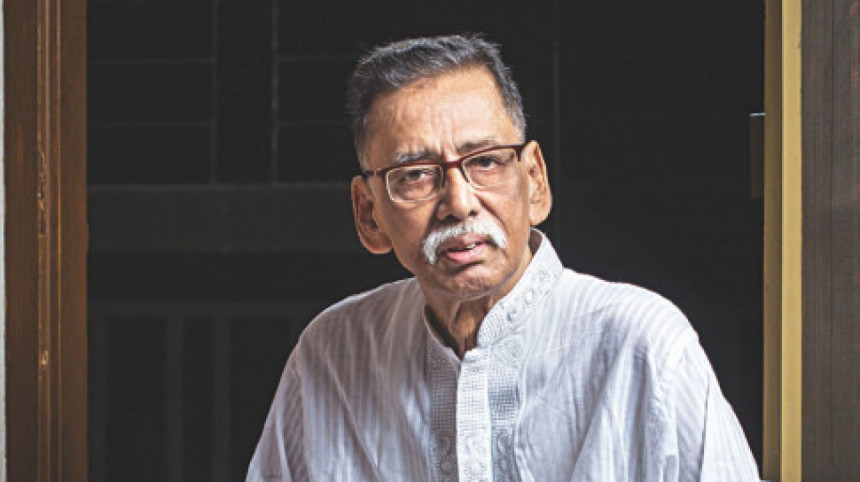Alam Khan
Composer And Music Director
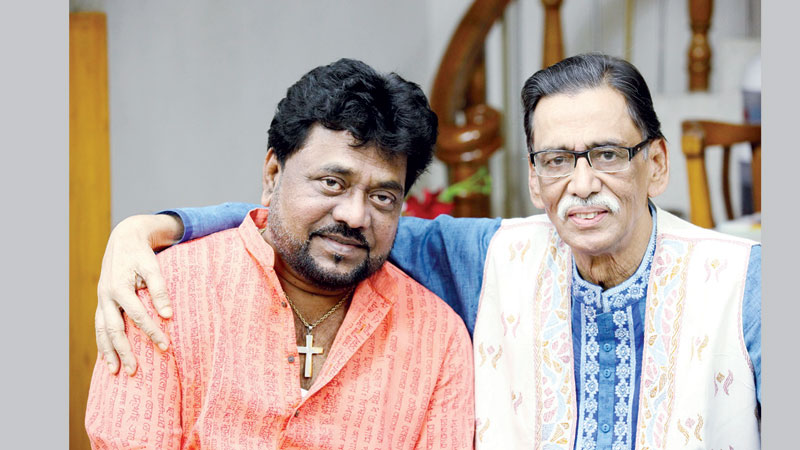
Alam Khan, full name Khurshid Alam Khan. Born on 22nd October 1944. He is one of the legendary music personalities of Bangladesh. He was a lyricist, composer and music director. He was awarded Best Music Director and Composer for his contribution to film songs for ‘Boro Bhalo Lok Chilo’ in 1982, ‘Tin Konna’ in 1985, ‘Surrender’ in 1987, ‘Dinkal’ in 1992, ‘Bagher Thaba’ in 1999, ‘Ebadot’ in 2009. ‘And in 2010 ‘Ki Jaadu Korila’ won a total of 7 National Film Awards given by the Government of Bangladesh, which is the highest record for any composer or music director to receive the National Film Award.
Birth & Childhood:
Alam Khan was born in 1944 in Baniagati village of Sirajganj district. His father Aftab Uddin Khan was a gold medalist graduate of the Bengali Department of Kolkata University. Later he was the Administrative Officer of the then East Pakistan Secretariat Home Department. Mother Jobeda Khanam was a perfect housewife. After staying in Sirajganj for some time, the whole family moved to Kolkata due to father’s job. After the partition of the country in 1947, he returned with his family and settled in Nilkhet barracks in Dhaka and enrolled in Palashi Barrack School. Later he lived in Azimpur Colony for a long time and spent his childhood. It was in this Azimpur colony that his keen interest in music was born. At the primary level of music education and practice, he learned to play the harmonium and banjo from the talented musicians of Azimpur colony. In 1958, his father Aftab Uddin Khan himself built a house in Kabi Jasimuddin Road, Kamalapur and started living with his family. At that time he started studying in 6th standard at Siddheshwari School. Among five brothers and two sisters, Alam Khan is the second son. Azam Khan, the famous rock icon artist of Bangladesh, was his younger brother.
Music Practice And Music Life:
During his stay at Kabi Jasimuddin Road, his passion for music grew. Due to the disagreement of father Aftab Uddin Khan in taking music as a profession, obstacles were created in his music education and practice. But, with the encouragement of his mother Jobeda Khanam, he continued to practice music. Alam Khan’s devoted love and deep attachment to music touched the heart of father Aftab Uddin Khan and advised him to approach a master for proper musical education. Following his father’s advice, Alam Khan started taking music lessons from Ustad Nani Chatterjee through his friend Chhotu Mia. He made his film debut as an assistant to Ustad Nani Chatterjee in the film ‘Poonam Ki Raat’ and joined Alauddin Little Orchestra as well. Later, music director Jahangir Hayat Khan Rumu son of renowned film director Abdul Jabbar Khan, lyricist Mukul Chowdhury, Golam Dastagir Gazi, Gopi Bollov Biswas and Chhotu Mia formed an orchestra group called ‘Ritu Shilpogoshthi’. He started creating background music for various Cultural events, Stage dramas, TV dramas as well. The first TV drama in which he composed the atmospheric music was ‘Bharate Bari’. Based on the timeless novel of the renowned journalist, writer and intellectual Shahidullah Kaiser, Alam Khan entered the country’s music scene by composing the background music of the play ‘Shongshoptok’ directed by the legendary cultural personality Abdullah Al Mamun. A few days later, he made his debut as a music director by telecasting the song on television ‘O Madhobi Go’ written by Mukul Chowdhury and sung by Rowshan Ara Mustafiz. In 1970, filmmaker Abdul Jabbar Khan gave Alam Khan the opportunity to start directing music for Bangla movie named ‘Kach Kata Heere’. His first song for that movie was written by Syed Shamsul Haque and sung by Rupa Farhad.
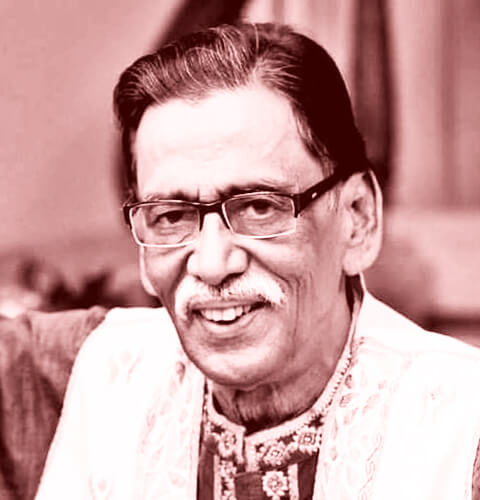
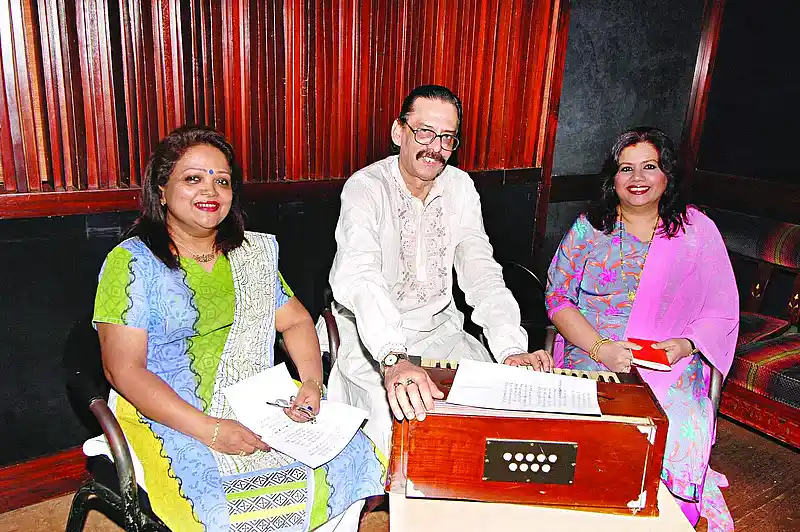
Career & Success:
Alam Khan’s first famous song was titled ‘Tablar Tere Kete Tere Kete Taak’ written by Kabir Anwar and sung by Khurshid Alam in the movie ‘Slogan’, followed by ‘Ek Chor Jai Chole’ written by Dewan Nazrul and sung by Andrew Kishore in the film ‘Protigya’ directed by A.J. Mintu recognized him as a modern and unique music director of our country. Written by Mukul Chowdhury and in the voice of Abdul Jabbar, the song ‘Ore Neel Dariya’ from the movie ‘Sareng Bou’, was released in 1978, and created a stir throughout Bangladesh. After that, several songs like ‘Ami Rojonigondha Fuler Moto’, Ki Jadu Korila, ‘Hayre Manush Rongin Fanush’ created a buzz in the mouths of people all over the country within a very short time. He created all kinds of songs including romantic, sad, spiritual, folk, rock in harmony with the story and screenplay in the film in unique and incomparable melodiousness. He was one of the pioneers of the paradigm that a film business can be successful only because of music, which left a considerable impact on the hearts of cinemagoers.
It is to be noted that in 1985, Alam Khan gave the opportunity to famous Indian singer Kumar Sanu to start the playback in movies with the song “Tin Konna Eki Chobi” from the movie ‘Tin Kanya’ composed by him.
Famous lyricists, such as Syed Shamsul Haque, Gazi Mazharul Anwar, Masud Karim, Shahidul Islam, Amjad Hossain, Dewan Nazrul, Mukul Chowdhury, Md. Rafiquzzaman, Moniruzzaman Monir, Munsi Wadud, Liton Adhikari Rintu, Milton Khandaker, Kamruzzaman Kajal, Kabir Bakul and famous renowned singers Syed Abdul Hadi, Abdul Jabbar, Mohammad Ali Siddiqui, Abdur Rauf, Khurshid Alam, Fahim Hossain, Rathindranath Roy, Azam Khan, Ferdaus Wahid, Sabina Yasmin, Runa Laila, Rowshan Ara Mustafiz, Indramohan Rajbangshi, Probal Chowdhury, Andrew Kishore, Nargis Parveen, Rulia Rahman, Shammi Akhtar, Shakila Zafar, Sheikh Ishtiaq, Kanakchapa, Khalid Hasan Milu, Baby Nazneen, Kumar Bishwajit, Tapan Chowdhury, Samina Chowdhury, Monir Khan, Asif, Rizia Parveen, Doly Sayantani, Robi Chowdhury, Agun, Biplab, Palash, Ankhi Alamgir, Jhumu Khan, Diba, etc. made the tunes of Alam Khan fulfill to reach into the heart of the millions. His musical creations for movies, Bangladesh Betar and Bangladesh Television will remain forever memorable. In addition, in the voices of India’s Kumar Sanu, Haimanti Shukla, Usha Uthup and Srabanti Majumdar his tunes will remain forever indelible.

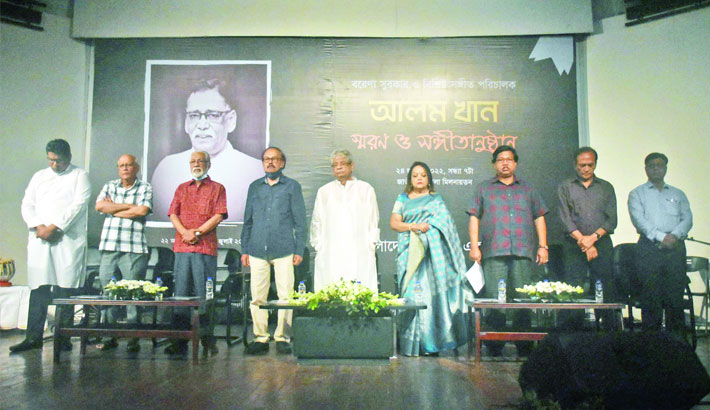
Notable Songs:
O re nil doria, ki jadu korila, toblar tere kete tere kete taak, o madhobi go, hayre manush rongin fanush, ami rojonigondha fuler moto, chader sathe ami debona tomar tulona, daak diachen doyal amare, ami chokkhu dia dekhtesilam jogot rongila, tora dekh dekh dekhre chahia, bhalobeshe gelam shudhu, jiboner golpo ache baki olpo, ami ekdin tomay na dekhile, kare bole bhalobasha kare bole prem, buke ache mon, tumi to ekhon amari kotha vabcho, ogo tumi je amar koto prio, shobaito bhalobasha chay, prem korecho tumi ar mon diechi ami, tumi jekhane ami shekhane, tin konna eki chobi, banda tuleche du haat, mone boro asha chilo, tumi acho shobi ache, ami tomar bodhu tumi amar shami, tel gele furaia, chokh bujile dunia andhar, chumki choleche eka pothe, tumi bole daakle, ajke na hoy bhalobasho, duniata mosto boro, akashete lokkho tara, sobar jibone prem ashe, bely fuler mala pore, manush nishpap prithibite ashe, mone premer batti jole,tomra kauke bolona, ke bole ami valo na, ki dia mon karila, dui noyone tomay dekhe, ei jibonto ekdin, amake dekhar shei chokh, eito ei chole gelo, podda nodir tirti gheshe, valobasha die more eto shukh diecho etc.
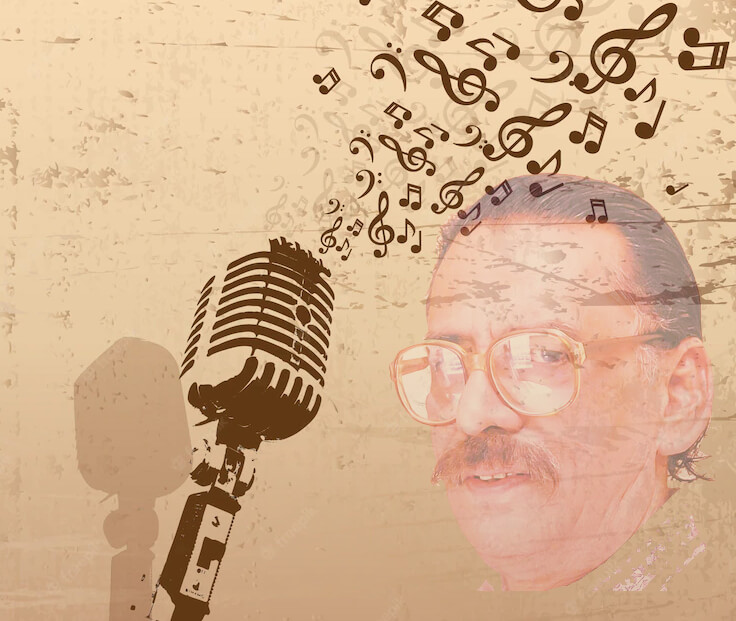
Notable Movies:
One after the other he directed music for 297 movies. Among them sareng bou, boro bhalo lok chilo, rojonigondha, ashirbaad, slogan, sriti tuku thak, love in shimla, ki je kori, gunda, rajrani, dost dushman, emiler goenda bahini, mintu amar naam, pran sojoni, rajdulari, ashami hajir, jibon nouka, aradhona, sonar cheye daami, moheshkhalir baake, ghorjamai, konnabodol, jobab, barud, bonduk, awara, loraku, choto ma, sokhi tumi kar, protigga, jadunagar, badhonhara, kotha dilam, ali asma, naat bou, nag purnima, pita mata shontan, man shomman, dinkal, veja chokh, dui jibon, keu karo noy, oshanti, johny, tin konna, shotota, dhormo amar ma, maiar naam moyna, surrender, ghrina, dolna, griho bibad, ochena, banglar bodhu, beporoa, bagher thaba, shotto mittha, ridoyer ayna, shesh thikana, bissho premik, ontore ontore, tyag, ebadot, ki jaadu korila etc.
Audio Cassettes & CDs
He also directed music for two audio cassettes and cds titled ‘bhalobeshe oporadhi’ and ‘valo achi’ in the voice of andrew kishore under the banner of audio production company sangeeta.
Awards & Honors:
He was awarded best music director and composer for his contribution to film songs for ‘boro bhalo lok chilo’ in 1982, ‘tin konna’ in 1985, ‘surrender’ in 1987, ‘dinkal’ in 1992, ‘bagher thaba’ in 1999, ‘ebadot’ in 2009. ‘and in 2010 ‘ki jaadu korila’ won a total of 7 national film awards given by the government of bangladesh, which is the highest record for any composer or music director to receive the national film award. He has also been honored with many honors and awards from many non-governmental organizations and institutions, including the bangladesh film producers association award and the bachoshash award for his outstanding contribution to music.
Personal And Family Life:
Alam Khan got married to Habibunnesa Gulbanu in 1976. His wife was originally a housewife. It is to be noted that Gulbanu Khan was also the lyricist of the song “Tumi To Ekhon Amari Kotha Vabcho” sung by Sabina Yasmin in the movie ‘Jibon Nouka’ directed by Masud Parvez and composed by Alam Khan. His elder son Arman Khan was a popular music director. At present, he holds the position of GM of the five-star resort ‘Grand Sultan Tea Resort & Golf’ located in Srimongal and holds the position of director in several other business organizations. Younger son Adnan Khan was once one of the busiest rhythm programmers in the Bangladesh music scene. At present, he is the managing director of Saints Eye Ltd., and he is also serving as a director in several other businesses.His only daughter, Anica Khan, is currently staying outside the country. In personal life he was an avid ‘fisherman’ after his music career. Whenever he got a chance, he would often fish in Dhaka’s Dhanmondi lake or Mugda lake with his assistant Gopi Bollov Biswas. He also had a special passion for sports. Whenever he got a chance, he used to rush to the then Dhaka Stadium (now Bangabandhu Stadium) to watch football matches. He was the supporter of Abahani Krira Chokro. Kazi Salauddin, Ashraf Uddin Ahmed Chunnu, and Sheikh Mohammad Aslam were his favorite footballers. He used to watch Bangladesh national cricket team games on television regularly.
Physical Health And Afterlife:
Alam Khan was diagnosed with lung cancer in late May 2011. He breathed his last on Friday, July 8, 2022, at 11:32 AM, at Bangladesh Specialized Hospital Limited (BSHL), Shyamoli, Dhaka. His first namaze janaza held at the premises of Channel I and the second namaze janaza in front of his own residence. He was buried in the ‘Zannatul Ferdaus’ graveyard after the third namaze Janaza at Masjidul Awlia Hazrat Khwaja Shah Mozammel Haque (R.) of ‘Zannatul Ferdaus Complex’, Mohajerabad, Srimongal Upazila, Maulvibazar District, Sylhet Region, named after the famous Sufi saint Hazrat Khwaja Shah Mozammel Haque (R.).
